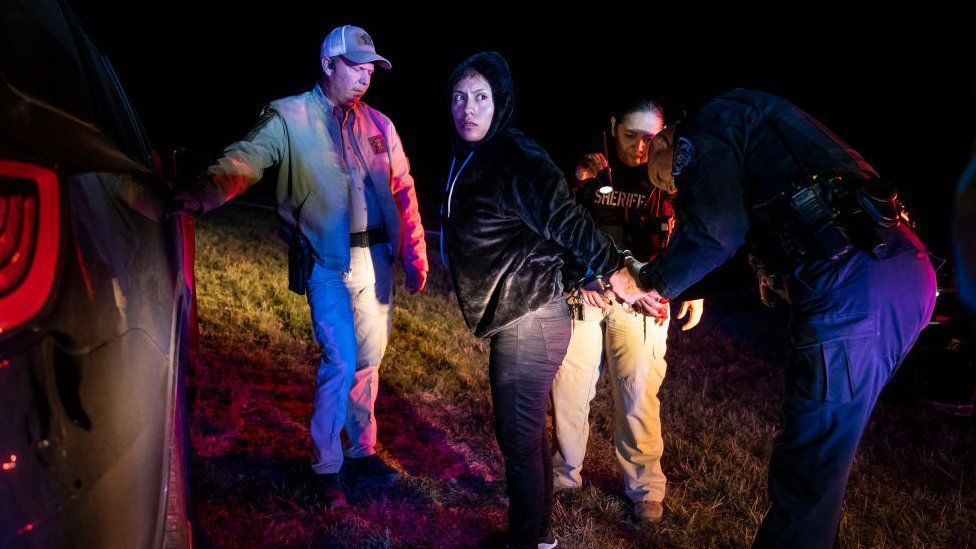ARTICLE AD BOX
 Image source, Getty Images
Image source, Getty Images
SB4 gives police officers in Texas broad powers to arrest migrants.
By Bernd Debusmann Jr
BBC News, Washington
The Supreme Court has allowed Texas to arrest and jail migrants, as part of the state's new tough immigration law.
Under the law, known as SB4, local and state police can arrest and prosecute those suspected of illegally crossing the Mexican border.
The Biden administration has called the law unconstitutional.
The decision comes a day after it was blocked by the same court while emergency appeals played out.
The law is among the toughest immigration measures taken by any US state in recent memory.
In total, SB4 was delayed three times by Justice Samuel Alito.
Then on Tuesday the Supreme Court said the law can take effect at the same time that the lower federal appeals court weighs its legality.
Texas Attorney General Ken Paxton hailed the decision as a "huge win" against the Biden administration and the American Civil Liberties Union (ACLU), which challenged the law in court.
"As always, it's my honour to defend Texas and its sovereignty, and to lead us to victory in court," he wrote in a post on X, formerly Twitter.
The ACLU, for its part, vowed that it "won't back down until this extreme anti-immigrant law is struck down for good."
The court's three liberal justices - Sonia Sotomayor, Elena Kagan and Ketanji Brown Jackson - dissented.
"The court gives a green-light that will upend the longstanding federal-state balance of power and sow chaos," Justice Sotomayor wrote in the dissenting opinion.
She also wrote that the law could "disrupt sensitive foreign relations, frustrate the protection of individuals fleeing persecution, hamper active federal enforcement efforts" and keep migrants from reporting abuse or trafficking.
SB4 gives local and state police officers the ability to stop and arrest anyone suspected of having crossed the border illegally, except in schools, healthcare facilities and places of worship.
Punishments would range from misdemeanours to felonies and potential imprisonment, or fines of up to $2,000 (£1,570).
Penalties for those who illegally re-enter Texas after having been deported could go up to 20 years in prison, depending on a person's immigration and criminal history.
The justice department has argued that SB4 infringes on the federal government's authority to secure the US border.
Additionally, the Biden administration has warned that it could harm relations with Mexico, which has condemned the law as "anti-immigrant".
Historically, the US government has created laws and regulations on immigration, as well as negotiated treaties and agreements with other countries.
SB4 was signed into law in December and was initially due to come into effect on 5 March.
The case will now head back to a three-judge panel from the New Orleans-based US Court of Appeals for the 5th Circuit, where oral arguments are scheduled for 3 April.
The losing party can then again appeal the case, sending it back to the Supreme Court.
The implementation of SB4 comes amid rising public concern over immigration and the US-Mexico border.
A Gallup poll released in February showed that nearly one-third of Americans believe that immigration is the single greatest problem the US faces, ahead of the government, the economy and inflation.

 10 months ago
50
10 months ago
50








 English (US) ·
English (US) ·